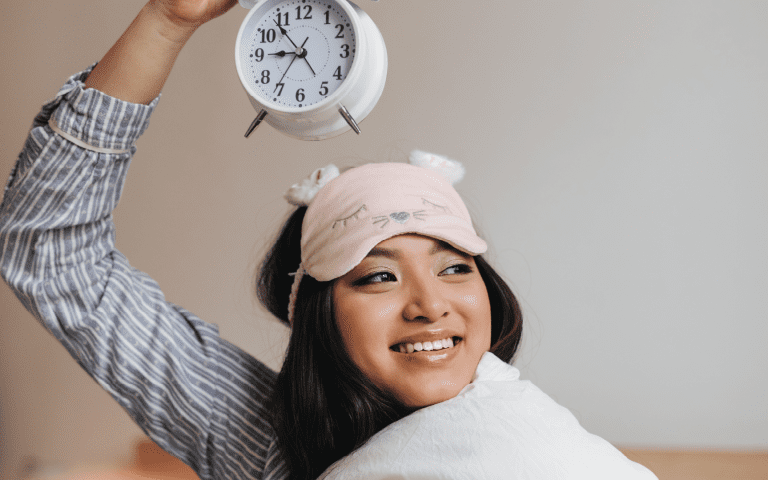
Have you ever wondered why we begin to feel sleepy around the same time each night or how we manage to wake up at a consistent hour for work, even on our days off, without needing an alarm? It’s all connected to our internal body clock. Our bodies naturally tend to follow a consistent pattern that aligns with our daily routines. Now, imagine what happens when your job involves travelling across different time zones or occasionally pulling all-nighters? In these situations, your body clock can get confused. In this article, we’ll help you learn more about this internal clock and share practical tips to help you fix your sleep schedule.
Understanding Your Internal Clock: The Circadian Rhythm
According to NIGMS, “Circadian rhythms are physical, mental, and behavioural changes that follow a 24-hour cycle”. Think of them as the body’s internal clock that operates in the background, ensuring essential tasks and processes occur at specific times.
Various body systems function according to circadian rhythms, which are synchronised with a biological clock located in the brain. This internal clock is influenced primarily by external cues, particularly light, explaining why circadian rhythms are closely tied to the day-night cycle. Among the several types of circadian rhythms or cycles, one that stands out is the sleep-wake pattern, which many of us are familiar with. Throughout the day, exposure to light triggers our internal clock to send signals that foster alertness, keeping us awake and engaged. As night time comes, this clock helps our body make melatonin, a sleep-promoting hormone, while continuing to emit signals that help us stay asleep. This connection to the day-night cycle helps us have a steady pattern of good sleep so that we can be more active during the day.
When in proper sync, a circadian rhythm can promote regular and revitalising sleep. However, when this rhythm gets disrupted, it can cause sleep problems such as insomnia.
How Will You Know If Your Body Clock Is Messed Up?
Continuous or intermittent disruptions in sleep patterns may result in issues with your “internal body clock” or a mismatch between this internal clock and the outside environment (like work schedules or social demands). This mismatch affects when and how long you sleep, leading to difficulties in functioning well at work, school and in social situations.
Some factors that can trigger circadian rhythm sleep disruptions include:
- Irregular work shifts
- Jet lag
- Inconsistent sleep schedule
- Limited exposure to sunlight for extended periods
- Taking certain medications
- Poor sleep habits
- Older age
On the other hand, the common signs of circadian rhythm sleep disruptions are the following:
- Insomnia
- Excessive daytime sleepiness
- Difficulty waking up in the morning
- Sleep loss
- Depression
- Stress
- Struggling in school or at work
- Inability to fulfil social commitments
How To Reset Your Body Clock & Fix Your Schedule
#1 Avoid long naps
Various studies have proven that taking power naps, especially in the afternoon, can quickly improve cognitive abilities, including alertness, performance and productivity for the rest of the day. However, balance is needed when it comes to napping. Napping for too long can lead to sleep inertia, causing impaired performance, reduced vigilance and a desire to return to sleep — the complete opposite of what a good nap should be. Moreover, a study suggests that long and late nappers may have a higher risk of poor sleep quality during the night. The general recommendation for healthy adults is 10 to 20-minute naps early in the afternoon, not later than 3 p.m.
#2 Stick to a consistent sleep-wake schedule
Maintaining regular and consistent sleep and waking time can greatly help your body get used to a new rhythm, which in turn assists in resetting your body clock. This practice helps your body internalise the pattern, making it easier to establish a balanced sleep schedule. Using an alarm without hitting snooze or establishing a routine can also be useful tools to stay on track.
#3 Don’t lie awake in bed
Some people struggle to fall asleep at night, even when they’ve felt tired all day. This can happen because of various factors, such as anxiety, depression, caffeine intake, sleep disorders, etc. If this becomes a regular occurrence, your brain might start connecting being awake with being in bed, making it even harder for you to sleep. Experts recommend trying a sleep reset if you’ve been attempting to sleep for around 20 minutes. This involves getting out of bed and engaging in relaxing, non-stimulating activities like reading, journaling, or practising gentle yoga.
#4 Restrict screen time at night
A neurologist stated that “The timing of sleep and wakefulness is controlled by two areas in the brain. One is highly sensitive to light and drives wakefulness, while the other, called the pineal gland, secretes the sleep hormone melatonin when the light dims in the evening”. Unfortunately, devices like cell phones, tablets and laptops emit blue light, which research has shown can hinder the body’s natural production of melatonin, leading to reduced sleepiness. Therefore, it’s advisable to avoid using these devices before bed.
#5 Be mindful of what you eat before bedtime
Research highlights a strong link between diet and sleep. To ensure a restful night, it’s best to avoid consuming foods high in fat, protein, and sugar close to bedtime. Additionally, it’s advisable to avoid stimulants like caffeine and alcohol before bed. Instead, opt for foods that are rich in fibre and B vitamins.
#6 Create an ideal sleep environment
Transform your bedroom into a sleep-friendly space for better sleep. Use soft lighting or switch it off entirely, silence your phone and keep the room cool (around 16°C to 18°C). A comfy mattress with good support can also make a big difference – Sealy offers a wide selection of comfortable mattresses and pillows for better sleep quality.
Fix Your Sleep Schedule Naturally
Understanding your body clock is key to improving sleep. Recognising factors like work shifts, jet lag, habits and lifestyles that disrupt it, as well as signs such as insomnia and daytime sleepiness, empowers you to take action. We hope our advice will be useful as you strive for better sleep.
At Sealy, we’re here to support your journey to better sleep. Explore our range of comfy mattresses and pillows for a better sleep experience. Try our mattress selector tool for personalised recommendations!



